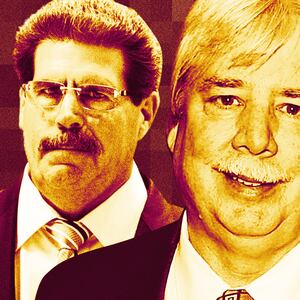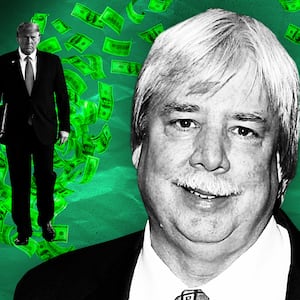As the dual civil and criminal New York investigations into the Trump Organization roll on, a New York state judge unsealed a court order on Friday giving Donald Trump’s company and some of his top lieutenants an ultimatum: Either turn over all the documents to comply with subpoenas from the New York Attorney General’s office (NYAG), or you’ll have to pay for a third party to do it for you.
In the filing, the Trump Organization agreed that if the NYAG believes the company has not fully complied with its requests—as prosecutors have long complained—the business will hire a firm to go through electronic records belonging to its top executives, including ex-President Donald Trump and his family.
New York Attorney General Letitia James put out a statement on Friday morning noting that this agreement caps a long-running effort to get the company to comply with her office’s demands for key documents in its ongoing investigation.
“For more than a year now, the Trump Organization has failed to adequately respond to our subpoenas, hiding behind procedural delays and excuses. Once again, the court has ordered that the Trump Organization must turn over the information and documents we are seeking, otherwise face an independent third-party that will ensure that takes place. Our work will continue undeterred because no one is above the law,” she said in the statement.
The order covers key documents from 25 people with ties to the company, including Trump himself, three of his children (Don Jr., Eric, and Ivanka), his personal assistant Rhona Graff, and top officers who are already under the microscope in the DA and AG criminal investigation. Some of those names likely to turn heads include chief operating officer Matthew Calamari, company controller Jeffrey S. McConney, and longtime chief financial officer Allen Weisselberg, who was indicted in July by Manhattan District Attorney Cy Vance on charges of tax fraud.
The agreement was originally filed on Sept. 3, but was sealed 10 days later—one day before an attorney for Eric Trump withdrew from the case. The judge unsealed the agreement on Friday following a request from legal news outlet Law360.
In the filing, the judge said that because “disputes have arisen regarding the Trump Organization’s document collection and production in response to [NYAG] subpoenas,” the company must produce a report by Sept. 30 detailing the actions it has taken to preserve, gather, and produce that evidence. If James still feels the company has not satisfied her request, the Trump Organization will have two weeks to hire, out of its own pocket, a third-party firm to oversee discovery of its electronic records. The company can select the firm, but James’ office must approve the choice.
The New York Attorney General and the Manhattan District Attorney are jointly prosecuting a criminal tax fraud case against the Trump Organization and its chief financial officer, Allen Weisselberg. But this matter predates their joint effort, dating back to when the office was pursuing its own investigation related to suspicious real estate valuations and allegations of potential bank fraud.
Former Justice Department attorney Jill Wine-Banks, who prosecuted Watergate, told The Daily Beast it was “about time” the Trump Organization was held accountable.
“Trump and the Trump Organization have stonewalled and procrastinated for more than a year. Subpoenas must be obeyed and not looking or not finding what is requested is noncompliance,” Wine-Banks said. “Also, since this subpoena predates the joint investigation with the DA, it may be related to real estate and bank fraud rather than tax fraud, but cannot guarantee that.”
The NYAG has subpoenaed records related to several Trump properties, including Trump International Hotel and Tower in Chicago, Trump National Golf Club in L.A., and two New York properties—40 Wall St. in Manhattan and the Seven Springs Estate in Westchester County, which was managed by Eric Trump. The NYAG alleges that the Trump Organization illegally manipulated the value of these properties in order to obtain tax breaks and favorable terms for bank loans and insurance.
According to court documents and two sources familiar with the investigation, previous iterations of this fight for records avoided a high-profile battle because defendants and witnesses eventually relented and gave up real estate and bank records.
The ongoing investigations by the New York AG and Manhattan DA have been running on parallel tracks for years.
DA Cyrus Vance Jr.'s office is believed to have started with an examination of Trump's "hush money" payments to the porn star Stormy Daniels, which led to multiple trips to the Supreme Court in a fierce battle to obtain then-President Trump's tax returns.
Meanwhile, the AG's office had already completed a series of successful lawsuits against Trump and his companies. It played a key role in a nationwide class-action lawsuit that exposed the false promises of his for-profit "education" scandal, Trump University.
Next, the AG’s office targeted the Trump Foundation and got a judge to dismantle the real estate mogul's charity by proving it had made glaring accounting errors and been misused to further his political campaign for president. By 2019, the office of the top prosecutor in New York State had set its sights on the Trump Organization itself, exploring whether company officers had lied about real estate values in an effort to commit bank fraud.
Investigators became particularly interested in a Bruce Wayne-style mansion just north of New York City: Seven Springs. What caught their attention was how Trump had repeatedly failed to develop a luxury golf course on the 212-acre, forested estate—and yet he kept valuing the property as if it could still be developed the way he had dreamed.
The estate includes several mansions and sprawls across three towns: Bedford, New Castle, and North Castle. Hence, investigators sought any evidence from those towns that would show whether the project had any real chances to succeed or if it was doomed—thus proving that Trump's valuations were unwarranted and possibly fraudulent.
Subpoenas demanded copies of “zoning, property planning, or other building and construction permissions” that had been sought by Trump’s firm for the property, Seven Springs LLC.










